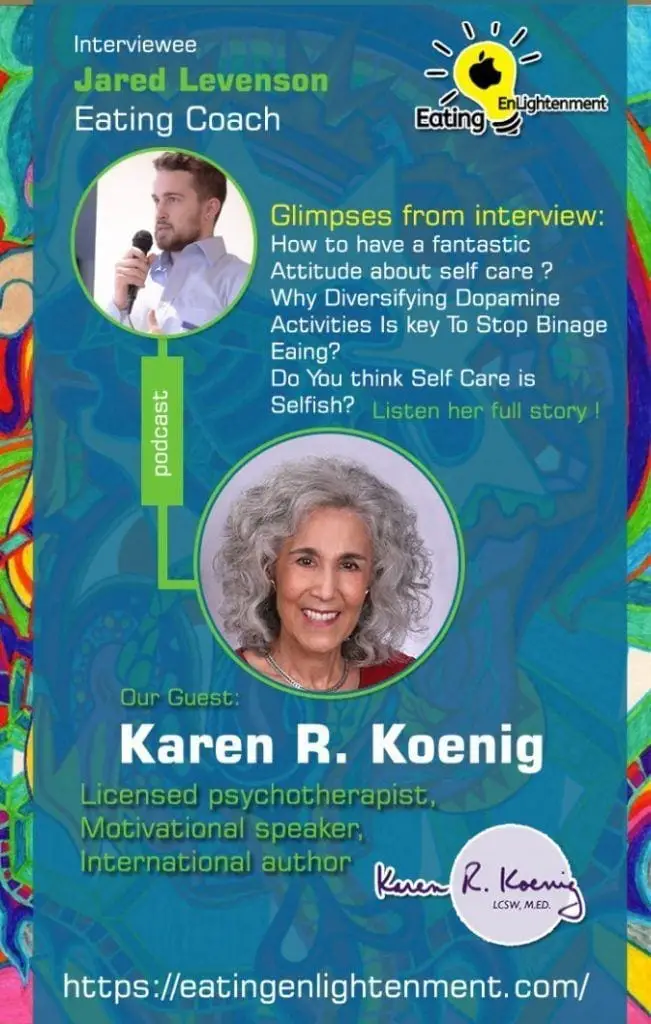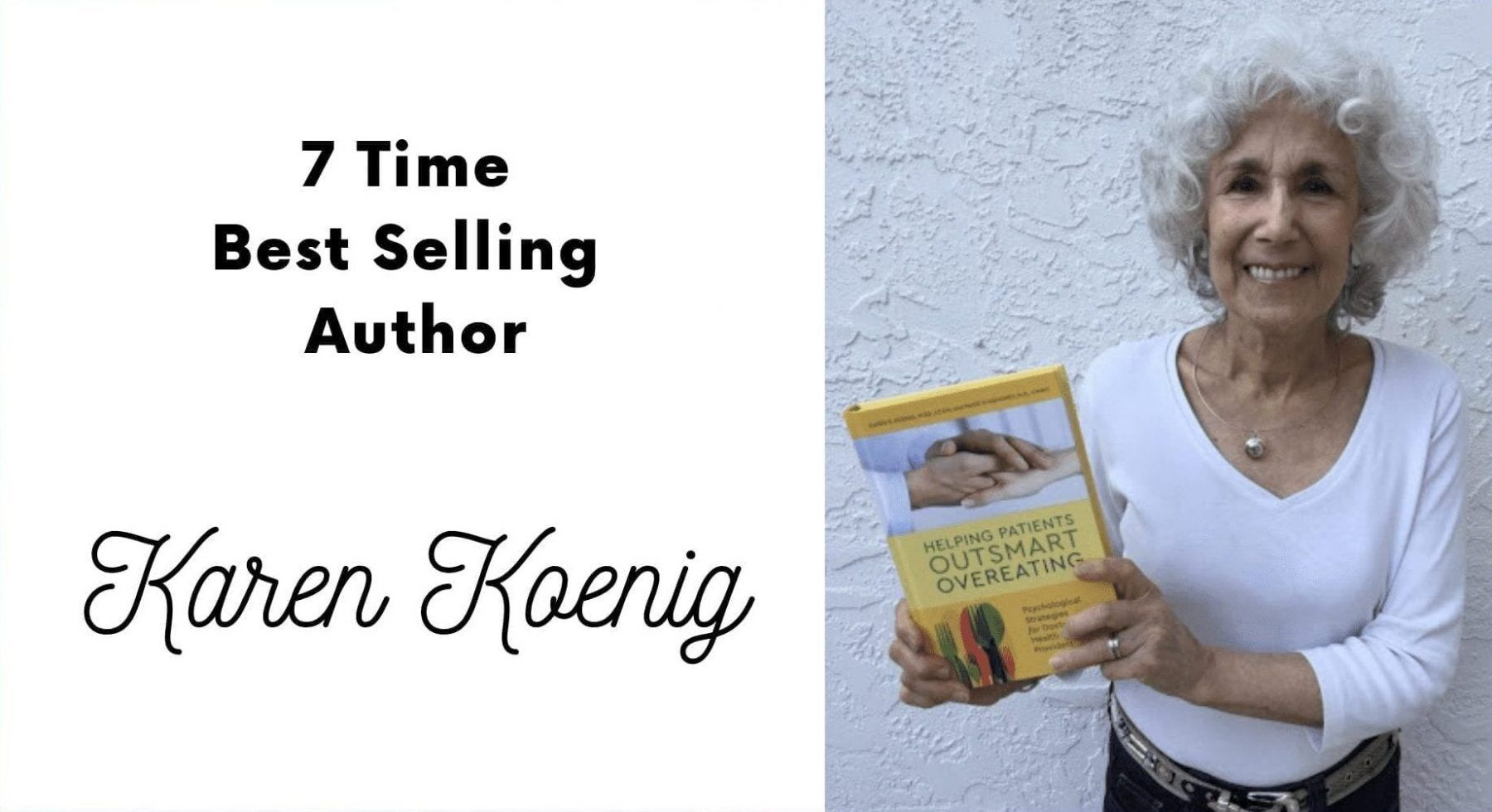
Karen R. Koenig is a wonderful resource, shining with eating disorder recovery wisdom!
Karen is a LCSW, MEd is a psychotherapist, popular blogger and an international, award-winning author of 7 books on eating, weight and body image.
Her next book, on self-talk and self-care, will be published in January 2021. Her expertise is in eating psychology which is the how and why of eating.
She has been treating and teaching dysregulated eaters for more than 30 years, currently practices in Sarasota, Florida, and can be found at https://www.karenrkoenig.com/.
You can also connect with Karen on her FB page here, or order her top reviewed bestseller “The Food and Feelings Workbook”.
In this interview Karen R. Koenig shares interesting stories like:
- Why Karen will continue working helping compulsive and emotional eaters until her last breath
- Why Karen loves writing and blogs so much (7 books and #8 on the way!)
- How To Have A Fantastic Attitude About Self-Care
- Why Diversifying Dopamine Activities Is Key To Stop Binge Eating
For more Eating Disorder Recovery Wisdom you may also search Apple/Android podcasts providers for Eating Enlightenment, or download the podcast directly using this link.
Eating Disorder Recovery Wisdom
Below are some sample questions I asked Karen during our interview. You’ll have to listen or watch the interview to get all the questions and the full answers!
The questions are bolded. I summarized Karen’s answers in italics.
Karen’s Journey
You’ve written many books, 7 from what I count on your website, what got you started on this journey?
For the first half of my life until around age 35 or so I was a dis-regulated eater. Then I got support, began the recovery process and a few years later began teaching about what I knew.
You’ve shown tremendous confidence on your journey – from multiple master degrees, to advisory boards, to various publications such as the Women’s Health and The Wall Street Journal – can you help us understand your mindset?
Well, my mindset has never been one of confidence. I suppose from the outside it looks like confidence. Yet for me it has been more of “why not?” What’s the worst that could happen? What if I just tried? I just keep trying things and keep trying and things fall into place. It’s an attitude of curiosity.
What made you co-found the Greater Boston Collaborative For Body Image and Eating Disorders?
I didn’t. I and a bunch of other therapists all co-founded it together.
Family
How did you relate to having an unsupportive mother who didn’t understand eating disorders? How would you recommend someone handle a family member that doesn’t get the conversation about eating disorders?
Well, it’s not our job to make our parents get it. It’s not our job to explain ourselves to our parents or to someone make our caregivers understand. It’s not. And sometimes family will drive us crazy. I remember trying to get my mom, telling her time after time that I don’t want my weight commented on, and she usually didn’t get it. I remember one time I said in the living room and refused to get up until she acknowledged and said that she wouldn’t make comments.
So sometimes I did something extreme and then she realized something, but then she would go back to being herself. And that’s ok. It’s part of life. You can’t get your validation needs met from your parents. You have to be able to disagree with them. It’s part of growing up. When we are children, we need to get validated from our parents. But after we are adults, it’s not longer their job to give us validation.
Self-Care
In terms of self-care, many people think getting 8 hours of sleep or getting a massage is self care. However, you are using the term self-care differently. Self-care is also the topic of your 8th book coming out in 2021. Can you describe what you mean by self-care?
By self-care I mean more of an attitude. It’s this attitude that I am worthy of love. It goes beyond the activities of self-care. If you notice people who have high self-esteem and good health, they effortlessly do self-care. It’s just part of who they are. They take a break from work. Or, they switch their focus and play. They relate. It just happens. When we learn to have this more expansive attitude of self-care where we are worthy of taking care of ourselves, that’s what I mean by self-care.
Self talk is a big part of what you mean by self-care, right? Obviously they are related. Yet self-talk and self-care are also different. How are they different?
Self-talk is an aspect of self-care. When we have low self-worth the way we speak to ourselves reflects our low opinion. We just say terrible things to ourselves. However most people are not aware of the terrible things they say to themselves. So self-talk is first becoming aware of the thoughts your having. After you become more aware, then we pick the self-care talk that we want. Usually we want to be calm and kind, so we practice speaking that way to ourselves.
Excuses
What if someone doesn’t have time to take care of themselves? They have too much work, family, etc?
I don’t buy it. Of course they have time. It’s a matter of priorities. If someone said, “Hey, here is 4 million dollars, you can have this money but only if you take better care of yourself.” Do you think this person would be able to find the time to listen to their body and better meet their emotional needs? Of course. This is where self-esteem comes in. It’s more a matter of believing that you are worthy of receiving love, and that you are worthy of giving yourself love.
What if someone thinks that self-care is selfish?
Self-care is seen as value neutral. It’s not either good or bad. It’s just something you do. Again, people who are naturally attuned to their emotions just naturally take care of themselves. It’s coming from a place of understanding what you need, and not being feeling shame or embarrassment for needing certain things.
Body Image
Oftentimes people can stop binge eating but they are tortured by a body image. How do you help someone heal from a painful body image?
It depends. I have clients that are 350 pounds and go to the beach. I have other clients who are only 30 pounds higher than they want to be. So some people have more of it than others. Underneath though, it comes down to depression, anxiety, and low self-esteem.
So how do you boost low self-esteem?
Well, for me I had relied on food to give me validation. I relied on food to make me feel safe. I relied on food to make me feel good. As I got over my food struggles and body image, I had to put myself out there and develop other activities that gave me dopamine and a sense of flow and creativity. Oftentimes people having only one source of happiness, and that source of happiness is food. So of course you are going to depend on food, and that in turn will fuel a negative body image.
So you must try, and put yourself out there, and keep trying new things until you develop more hobbies that you like and friends. You have to have other ways of finding happiness besides food. If you can find other ways of being happy, you’ll start living your life. You’ll start becoming happier. This in turn will greatly help with the negative body image thoughts. You just won’t care as much because these thoughts are no longer seen as holding you back.
Modern Day
How have you seen the Eating Disorder field change over 35 years?
Well, back when I started, there wasn’t much awareness of Eating Disorders. There were general therapists, yes, but going to a therapist and talking about food would have seemed very strange. So nowadays there is much more awareness of eating disorders.
You’ve helped create an App, “APPetite” which is very forward thinking. Where else do you see future trends of helping Eating Disorders?
It seems that technology has both it’s up and downsides. Certainly there is tremendous amounts of pressure, especially on women, to look a certain way.
What have been some important “Eating Enlightenment” moments along the way? These are lightbulb moments where you realize that the way you’d been relating to food or life was unskillful and that you could do things differently. Moments where you gain Eating Disorder Recovery Wisdom.
It’s not about food, it’s about loving yourself.
For more eating disorder recovery wisdom, please see this other interview of mine, a conversation with Shags, a father whose daughter suffered from bulimia.



